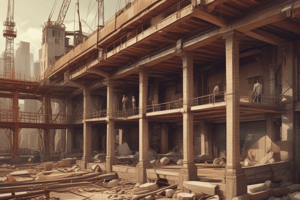Podcast
Questions and Answers
What is the term for the process of breaking down of rocks into smaller fragments due to weathering?
What is the term for the process of breaking down of rocks into smaller fragments due to weathering?
- Disintegration (correct)
- Denudation
- Exfoliation
- Erosion
What is the primary reason for using air-entraining agents in concrete?
What is the primary reason for using air-entraining agents in concrete?
- To improve the workability of concrete
- To reduce the segregation of concrete
- To increase the strength of concrete
- To increase the resistance of concrete to freeze-thaw cycles (correct)
What is the name of the method used to analyze the stability of a slope in terms of the resultant force and its inclination to the horizontal?
What is the name of the method used to analyze the stability of a slope in terms of the resultant force and its inclination to the horizontal?
- Taylor's Method
- Fellenius Method (correct)
- Bishop's Method
- Swedish Method
What is the term for the maximum stress that a material can withstand without undergoing deformation?
What is the term for the maximum stress that a material can withstand without undergoing deformation?
What is the name of the type of beam that is subjected to a uniform load over its entire length?
What is the name of the type of beam that is subjected to a uniform load over its entire length?
What is the primary factor that affects the durability of concrete in a marine environment?
What is the primary factor that affects the durability of concrete in a marine environment?
In a simply supported beam, what is the maximum bending moment that occurs?
In a simply supported beam, what is the maximum bending moment that occurs?
What is the purpose of providing a freeboard in a hydraulic structure?
What is the purpose of providing a freeboard in a hydraulic structure?
What is the term for the process of compacting soil by applying a large amount of pressure over a small area?
What is the term for the process of compacting soil by applying a large amount of pressure over a small area?
What is the name of the method used to analyze the flow of water in a pipe network?
What is the name of the method used to analyze the flow of water in a pipe network?
Flashcards are hidden until you start studying
Study Notes
Civil Engineering Mock Test Subjects
Building Materials
- Examines the physical and chemical properties of materials used in construction
- Covers types of materials, their uses, and sustainability
Solid Mechanics
- Deals with the study of internal forces and deformations of solid objects
- Includes stress, strain, and deformation analysis
Concrete & Masonry
- Focuses on the properties, production, and applications of concrete
- Covers masonry structures, materials, and construction techniques
Structures Design
- Involves the analysis and design of buildings, bridges, and other structures
- Covers load calculations, structural systems, and materials selection
Pipe Flow
- Studies the behavior of fluids in pipes, including flow rates and pressure
- Covers pipe materials, fittings, and network design
Design of Steel Structures
- Examines the properties, design, and fabrication of steel structures
- Covers load calculations, member design, and connections
Open Channel Flow
- Deals with the flow of fluids in open channels, including rivers and canals
- Covers flow regimes, hydrology, and channel design
Hydrology
- Studies the properties, distribution, and flow of water on the Earth's surface
- Covers precipitation, evaporation, and runoff processes
Hydraulic Machines & Hydro Power
- Examines the principles and applications of hydraulic machines
- Covers hydroelectric power generation, pumps, and turbines
Construction Practices, Planning & Management
- Covers the planning, organization, and execution of construction projects
- Includes project management, scheduling, and cost control
Fluid Mechanics
- Deals with the behavior of fluids under various forces and conditions
- Covers fluid properties, flow regimes, and applications
Surveying
- Involves the measurement and mapping of natural and man-made features
- Covers leveling, triangulation, and GPS surveying techniques
Solid Waste Management
- Examines the principles and practices of waste management, including collection, treatment, and disposal
- Covers waste reduction, recycling, and landfill management
Environmental Engineering
- Deals with the application of engineering principles to environmental issues
- Covers water and air pollution, noise pollution, and environmental impact assessments
Water Resource Engineering
- Studies the planning, design, and management of water resources
- Covers water supply, treatment, and distribution systems
Transportation Engineering
- Examines the planning, design, and operation of transportation systems
- Covers highway design, traffic flow, and transportation planning
Civil Engineering Mock Test Subjects
Building Materials
- Examines the physical and chemical properties of materials used in construction
- Covers types of materials, their uses, and sustainability
Solid Mechanics
- Deals with the study of internal forces and deformations of solid objects
- Includes stress, strain, and deformation analysis
Concrete & Masonry
- Focuses on the properties, production, and applications of concrete
- Covers masonry structures, materials, and construction techniques
Structures Design
- Involves the analysis and design of buildings, bridges, and other structures
- Covers load calculations, structural systems, and materials selection
Pipe Flow
- Studies the behavior of fluids in pipes, including flow rates and pressure
- Covers pipe materials, fittings, and network design
Design of Steel Structures
- Examines the properties, design, and fabrication of steel structures
- Covers load calculations, member design, and connections
Open Channel Flow
- Deals with the flow of fluids in open channels, including rivers and canals
- Covers flow regimes, hydrology, and channel design
Hydrology
- Studies the properties, distribution, and flow of water on the Earth's surface
- Covers precipitation, evaporation, and runoff processes
Hydraulic Machines & Hydro Power
- Examines the principles and applications of hydraulic machines
- Covers hydroelectric power generation, pumps, and turbines
Construction Practices, Planning & Management
- Covers the planning, organization, and execution of construction projects
- Includes project management, scheduling, and cost control
Fluid Mechanics
- Deals with the behavior of fluids under various forces and conditions
- Covers fluid properties, flow regimes, and applications
Surveying
- Involves the measurement and mapping of natural and man-made features
- Covers leveling, triangulation, and GPS surveying techniques
Solid Waste Management
- Examines the principles and practices of waste management, including collection, treatment, and disposal
- Covers waste reduction, recycling, and landfill management
Environmental Engineering
- Deals with the application of engineering principles to environmental issues
- Covers water and air pollution, noise pollution, and environmental impact assessments
Water Resource Engineering
- Studies the planning, design, and management of water resources
- Covers water supply, treatment, and distribution systems
Transportation Engineering
- Examines the planning, design, and operation of transportation systems
- Covers highway design, traffic flow, and transportation planning
Studying That Suits You
Use AI to generate personalized quizzes and flashcards to suit your learning preferences.




